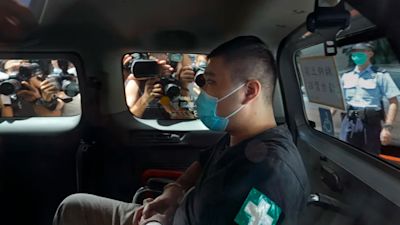Hong Kong: First person charged under controversial security law found guilty of terrorism

The first person to be tried under Hong Kong's controversial national security law has been found guilty of secessionism and terrorism in a landmark ruling on Tuesday.
The Hong Kong High Court handed down the verdict in the case of Tong Ying-kit and has been condemned by human rights activists.
Tong Ying-kit, 24, was accused of driving his motorcycle into a group of police officers while carrying a flag bearing the protest slogan "Liberate Hong Kong, revolution of our times" on July 1 last year.
He faces a maximum sentence of life in jail, but his lawyers are expected to argue for a lighter punishment at his sentencing hearing on Thursday.
The alleged incident happened a day after Beijing imposed the sweeping national security legislation on Hong Kong following months of anti-government protests in 2019.
Since then, more than 100 people have been arrested under the security legislation.
Tong pleaded not guilty to charges of inciting secession and terrorism, and an alternative charge of dangerous driving.
The verdict has been closely watched for indications of how similar cases will be dealt with in the future.
The trial, which ended on July 20, was held in the High Court with no jury, under rules allowing the exception from Hong Kong’s common law system if state secrets need to be protected, foreign forces are involved or if the personal safety of jurors needs to be protected.
Trials are presided over by judges handpicked by Hong Kong leader Carrie Lam.
Reading the verdict, Justice Esther Toh said Tong "committed terrorist activities causing or intended to cause grave harm to the society" in pursuit of a political agenda.
His behaviour was an act of violence aimed at coercing the central and Hong Kong governments and intimidating the public, she said.
Carrying the slogan-bearing flag constituted an act of incitement to secession, she added.
Because the prosecution was certain it had proved "each and every element" of the terrorism and secession charges, it decided not to proceed with the dangerous driving charge.
Tong did not speak during the reading of the verdict. He waved to his parents and others in the gallery as he was escorted from the chamber.
Tong’s defence lawyer had said it was impossible to prove Tong was inciting secession merely by having used the slogan.
The defence also said there was no evidence Tong committed the act deliberately, that he avoided crashing into officers, and that his actions could not be considered terrorism since there was no serious violence or harm to society.
The verdict was immediately condemned by Amnesty International, which called it "the beginning of the end for freedom of expression in Hong Kong".
Asia-Pacific regional director Yamini Mishra said: "People should be free to use political slogans during protests, and Tong Ying-kit should not be punished for exercising his right to free speech.
"It is particularly clear that he should never have been charged with a ‘national security’ offence carrying a possible life sentence," she added.
However, Beijing has dismissed criticisms, saying it is merely restoring order to the city and instituting they same type of national security protections found in other countries.
What is the national security law and why is it controversial?
The national security law came into effect on June 30 and is widely seen as a means to curb dissent after anti-government protests rocked Hong Kong last year.
The law targets secession, subversion, terrorism and colluding with foreign forces with punishments up to life in prison.
Acts of vandalism against government facilities or public transport can be prosecuted as subversion or terrorism, while anyone taking part in activities deemed as secessionist would also be in violation of the new law.
The law directly targets some of the actions of anti-government protesters last year, which included attacks on government offices and police stations, damage to subway stations, and the shutdown of the city’s international airport.
The national security law further blurs the distinction between the legal systems of semi-autonomous Hong Kong, which maintained aspects of British law after the 1997 handover, and the mainland’s authoritarian Communist Party system.
Authorities have banned the protest slogan "Liberate Hong Kong, revolution of our times", stating that it has secessionist connotations. Library books and school curricula have also been investigated for alleged secessionist messages.